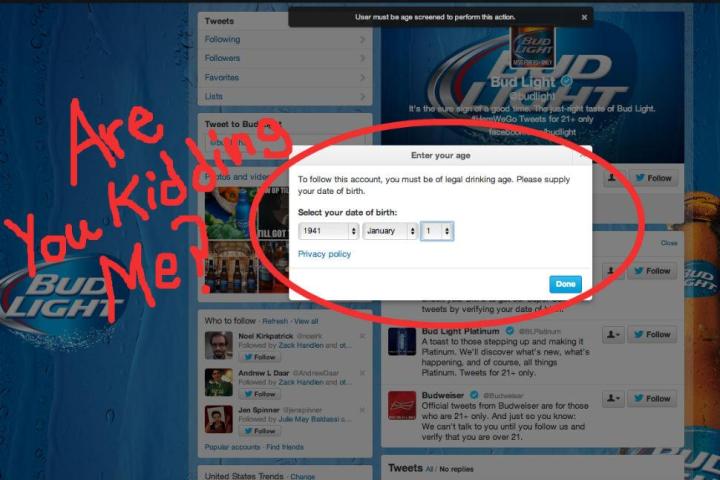
Twitter recently introduced a revamped age-verification system to deter underage users from following the accounts of alcohol brands. So if a 17-year-old wants to see what Bud Light has to say on Twitter (which, honestly, not sure why that would be something they’d want to do, but OK) they will now be confronted with an adult verification system asking for their date of birth before they’re allowed to follow. Twitter compares the age entered to the legal drinking age of the Twitter user’s country, and bars users from following the alcoholic brand if they’re under the limit.
What Twitter doesn’t do is take any measures to make sure the user isn’t lying. There isn’t some special program matching your Twitter handle to your social security card. It’s the digital equivalent of using a trust system at a bar, where a blind bouncer simply asks the people in line what their age is. It’s extremely easy to circumvent. In fact, it’s so easy to circumvent that it’s actually kind of insulting that Twitter thinks this age gate will stop anyone from accessing content. If a bar actually employed a blind bouncer who took each prospective customer at their word instead of checking their ID, it would get closed down, because it’d become a hub for underage drinking.
I told Twitter I was born in 1941 in order to follow the Bud Light account, and I’m six haggard years over the legal drinking age in the U.S. Twitter didn’t think it was weird that an old-ass lady is a social media blogger who constantly makes Kanye West jokes, which verifies my suspicion that the company does absolutely no follow-up investigation to confirm ages entered.
(Also, Bacardi’s version of an age gate is simply putting “You agree that you are 21 years of age or older to interact with BACARDI on Twitter” as the company bio, which is precious.)
Underage people might not have life experience from which to draw wisdom and/or understand that life is not a box of YOLOs, but they’re fully capable of putting in a false age on social media websites. The age gates on social media aren’t real barriers — they’re flimsy ways to ameliorate critics concerned that these platforms aren’t all-ages appropriate. And somehow, they’re considered a way to comply with the Children’s Online Privacy Protection Act (COPPA) which is actual foolishness, but I’ll get to that in a minute.
This isn’t just Twitter’s problem. The “age gating works” delusion has spread across all sorts of digital platforms, which is unfortunate because age gates don’t work. Just look at Snapchat’s “child-friendly” iteration, SnapKidz — it safeguards Snapchat for children under 13 … but only if they choose to accurately enter their age. If some wee saint of a tween accurately enters their age when they’re setting up Snapchat, it will turn into a neutered version. But their less honest contemporaries with the know-how to type in the wrong age will have no such protections from dick pics from strangers.
Again: age gates don’t work, and there’s no use pretending they do. But companies are still going to continue putting them up and pretending like they’re helpful, and I can’t blame them. COPPA considers age gating a way of complying, which can help platforms like Twitter and the brands that use it avoid getting in trouble. But age gates that are as bogus as Bacardi and Bud Light’s Twitter barriers shouldn’t be considered any sort of deterrent to keep underage people away. A precocious six year old could be tweeting at them for all they know. So the people revising COPPA need to smarten up.
It’s a tricky situation for social networks and brands that want to use them — some material and social features aren’t necessarily appropriate for all ages, but it’s really easy to lie on the Internet. I’m not saying that’s not a problem. But unless they devise a way to actually verify someone’s age, it’s insulting to consumers to pretend like age gating does a damn thing. It would be a much more useful gesture to take the money that went into setting up these foolish “precautions” and use it to fund digital literacy lessons for young people. And obviously COPPA is well-intentioned — I’m all for protecting the privacy of children — but pretending age gates are a legitimate way to do so isn’t helping anyone.
